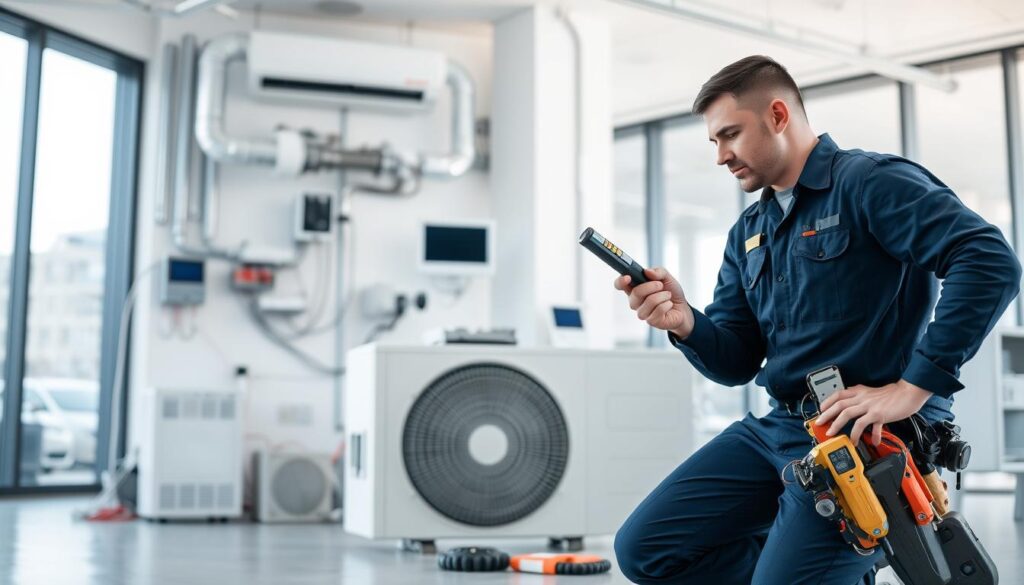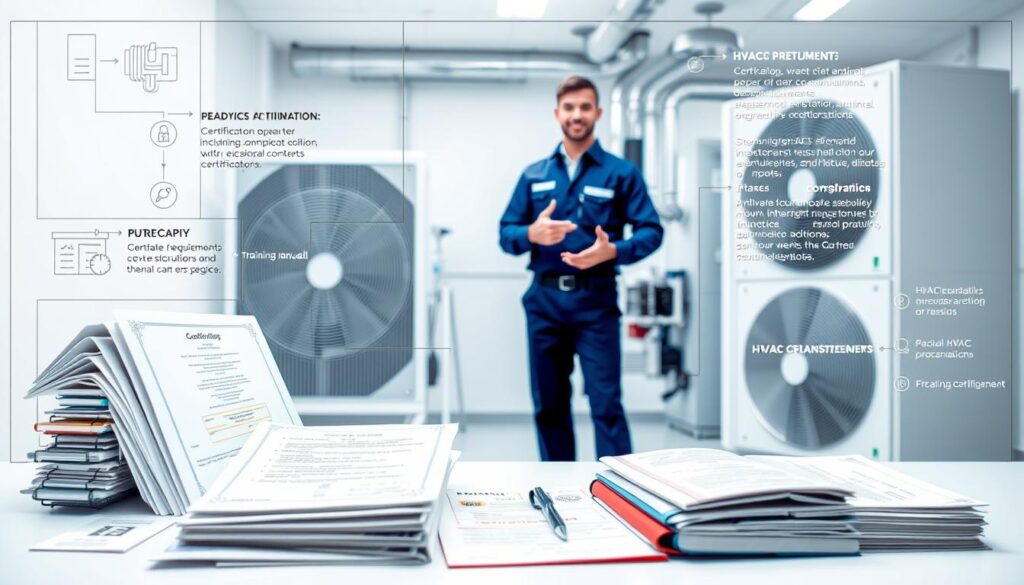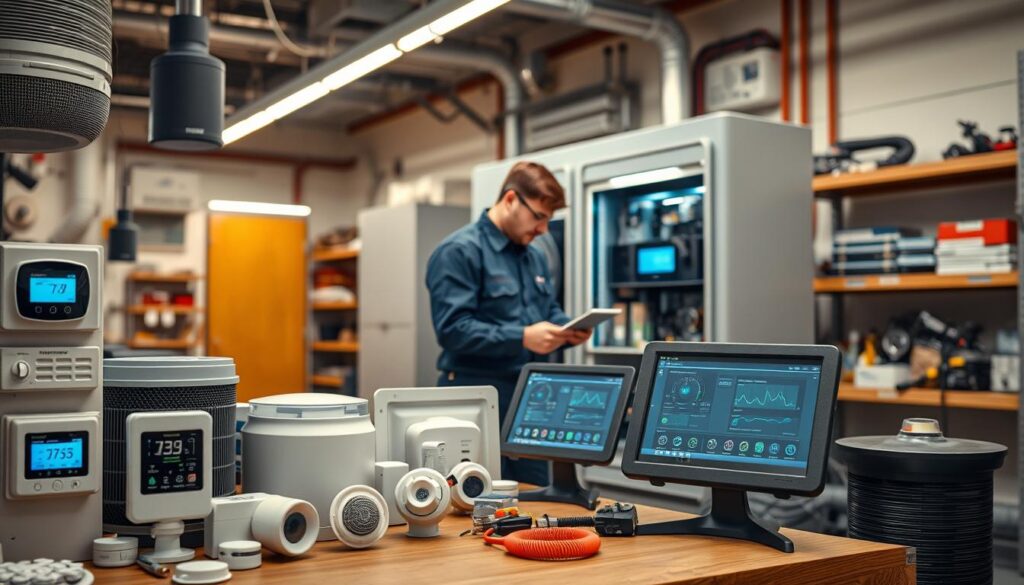Affiliate Disclosure
HVAC Guide Guys is a participant in the Amazon Services LLC Associates Program, an affiliate advertising program designed to provide a means for sites to earn advertising fees by advertising and linking to Amazon.
How to Get Started in HVAC? Are you ready to dive into a career that keeps America comfortable and thriving? What if you could secure a stable, high-paying job that’s always in demand, without spending years in traditional college?

The HVAC industry offers exciting opportunities for those seeking how to get started in HVAC. As buildings and technologies continue to advance, skilled technicians are more critical than ever. Entry level HVAC jobs provide an excellent pathway to a rewarding career with significant growth potential.
From residential installations to commercial system maintenance, HVAC technicians play a crucial role in maintaining comfortable environments. This guide will walk you through everything you need to know about launching a successful career in this dynamic field.
Key Takeaways
- HVAC offers stable and lucrative career opportunities
- Minimal educational investment compared to traditional college degrees
- High demand across residential and commercial sectors
- Potential for significant career advancement
- Hands-on work with cutting-edge technologies
Table of Contents
Why Choose a Career in HVAC Technology
Thinking about starting a career in HVAC is exciting. It’s a field that’s always in demand. You’ll find work in homes, offices, and factories.
The job market for HVAC techs is booming. This is thanks to several factors:
- Aging buildings need regular upkeep.
- More people want energy-saving systems.
- Good air quality is becoming a priority.
- New tech in climate control is emerging.
Job Market Demand and Growth Potential
The Bureau of Labor Statistics says HVAC tech jobs will grow 5% by 2030. That’s about 38,500 new jobs every year. You can move up in your career, from working on homes to designing systems for big buildings.
Salary Expectations and Benefits
HVAC workers get good pay. They make around $50,590 a year, with some making up to $80,000. Plus, they get great benefits like:
- Health insurance
- Retirement plans
- Paid training
- Bonuses for good work
Career Stability and Job Security
Investing in HVAC training means a stable career. Every building needs climate control, so there’s always work. HVAC jobs are safe from economic ups and downs.
The HVAC industry values your skills and problem-solving. You’ll be rewarded for your hard work.
Explore Our HVAC Shop
Looking for top-rated HVAC tools, parts, and accessories? Visit our shop and find the perfect solution for your needs.
Visit the ShopEssential Educational Requirements for HVAC Technicians
Starting a career in HVAC technology requires understanding the key educational steps. Your path begins with a strong academic base. This prepares you for HVAC trade schools and specialized training.
Most employers look for a high school diploma or GED as the starting point for HVAC training. Your studies should focus on important subjects. These include math, physics, chemistry, computer tech, and electronics.
- Mathematics (algebra and geometry)
- Physics
- Chemistry
- Computer technology
- Electronics
High school students aiming for HVAC careers should take technical and vocational classes. These classes give you a solid start in electrical systems, mechanical principles, and refrigeration basics.
| Educational Path | Typical Duration | Key Learning Outcomes |
|---|---|---|
| High School Technical Track | 4 years | Basic technical skills and knowledge |
| Trade School HVAC Program | 6-24 months | Specialized technical training |
| Community College Certificate | 1-2 years | Advanced technical and theoretical knowledge |
Investing in your education is key to becoming a top HVAC technician. The right start leads to great career chances in this exciting field.
How to Get Started in HVAC: First Steps and Prerequisites
Starting a career in HVAC needs careful planning and knowing the industry’s basics. Whether you’re in high school or looking to change careers, starting in HVAC can lead to a fulfilling job.
To begin in HVAC, you must plan and meet certain requirements. Let’s look at what you need to become an HVAC technician.
High School Preparation
High school is key for a strong start in HVAC. Focus on skills that matter for this field:
- Mathematics courses (algebra, geometry)
- Physics and science classes
- Shop or technical education programs
- Computer skills and basic electronics
Basic Skills and Qualifications
To get into entry-level HVAC jobs, you must meet certain criteria:
| Requirement | Details |
|---|---|
| Minimum Age | 18 years old |
| Education | High school diploma or GED |
| Driver’s License | Valid state driver’s license |
Physical Requirements and Aptitudes
HVAC technicians need certain physical and personal traits to do well:
- Physical strength and stamina
- Mechanical aptitude
- Excellent problem-solving skills
- Comfort working in various environments
- Strong communication abilities
“Success in HVAC is about combining technical knowledge with practical skills and adaptability.” – HVAC Industry Professional
Knowing these basics will prepare you for a rewarding HVAC career.
HVAC Training Programs and Certification Options
Starting a career in HVAC means choosing the right training. Trade schools for HVAC offer detailed programs. They mix theory with practical skills for real-world success.
Looking into hvac certification courses, you’ll find many options. They fit different learning styles and career goals:
- Community college programs
- Technical institute certifications
- Vocational training centers
- Online and hybrid learning platforms
Pre-apprenticeship programs are great for new HVAC technicians. They give foundational skills and hands-on experience before apprenticeships. The curriculum includes:
- HVAC system fundamentals
- Electrical principles
- Refrigeration technology
- Safety protocols
Certifications from HVAC Excellence and North American Technician Excellence (NATE) are key. They show your skills and dedication to employers. Investing in quality hvac certification courses is wise.
Explore Our HVAC Shop
Looking for top-rated HVAC tools, parts, and accessories? Visit our shop and find the perfect solution for your needs.
Visit the ShopUnderstanding HVAC Apprenticeship Programs
HVAC apprenticeship programs are a great way to start your career in heating, ventilation, and air conditioning. They mix practical work with classroom learning. This helps you become a skilled HVAC technician.
Looking into HVAC apprenticeships, you’ll see a mix of hands-on and classroom learning. These programs last 3-5 years. They offer a detailed curriculum to make you a professional.
Program Duration and Structure
HVAC apprenticeships are well-planned for thorough training. Here’s what you can expect:
- Total training hours: 8,280 on-the-job hours
- Classroom instruction: 720 technical education hours
- Average program duration: 3-5 years
On-the-Job Training Components
You’ll learn by doing under the watch of skilled HVAC pros. You’ll focus on:
- HVAC system installation techniques
- Equipment maintenance and repair
- Diagnostic procedures
- Safety protocols and best practices
Classroom Instruction Requirements
| Classroom Focus Areas | Learning Objectives |
|---|---|
| Technical Mathematics | Calculations for system design and performance |
| Blueprint Reading | Understanding system layouts and design specifications |
| HVAC Theory | Advanced technical knowledge of heating and cooling systems |
Your apprenticeship lets you earn while learning, with pay increases as you gain skills. Completing these programs prepares you for a rewarding HVAC career.
Essential HVAC Licenses and Certifications

Getting into the HVAC world can be tough. You need the right licenses and certifications to succeed. These are key to your career in HVAC.
The EPA Section 608 Technician Certification is very important. It comes in four levels:
- Type I: For small appliances
- Type II: For high-pressure appliances
- Type III: For low-pressure appliances
- Universal: Covers all refrigeration equipment
After getting the EPA certification, you can get NATE certification. NATE shows you have advanced skills in HVAC.
| Certification | Requirements | Career Impact |
|---|---|---|
| EPA Section 608 | Pass written exam | Legal requirement for handling refrigerants |
| NATE Certification | Practical and written exams | Enhanced professional credibility |
| State-Specific Licenses | Varies by state | Legal authorization to work |
Getting certified in HVAC involves learning in class and hands-on training. Each state has its own rules for licenses. Make sure you know what’s needed in your area.
It’s also important to keep learning. Many certifications need you to update your skills regularly. This keeps you up-to-date with new tech and standards.
Explore Our HVAC Shop
Looking for top-rated HVAC tools, parts, and accessories? Visit our shop and find the perfect solution for your needs.
Visit the ShopCareer Paths in the HVAC Industry
The HVAC industry offers many exciting career paths. With new technology and a focus on energy efficiency, your career can grow. You can explore different areas, whether you’re interested in residential or commercial HVAC.
Residential HVAC Specialist
Residential HVAC specialists work on home comfort systems. Your main tasks include:
- Installing and maintaining home heating and cooling systems
- Diagnosing equipment problems
- Providing customer service and recommendations
- Ensuring optimal home temperature and air quality
This job needs strong people skills and technical knowledge of home HVAC systems.
Commercial HVAC Technician
Commercial HVAC technicians handle complex systems in big places. You’ll need advanced skills and knowledge:
- Managing large-scale cooling and heating systems
- Working in diverse settings like offices, hospitals, and manufacturing facilities
- Understanding sophisticated industrial equipment
- Implementing energy-efficient solutions
HVAC Business Owner Opportunities
Starting your own HVAC business can be very rewarding. It requires technical skills and business management abilities.
- Develop strong business management skills
- Create marketing strategies
- Build a reliable client network
- Invest in continuous professional development
Your technical knowledge is a great base for starting your own HVAC business.
Tools and Technology in Modern HVAC

The HVAC industry has changed a lot with new technologies. Now, HVAC technicians need special skills to succeed. They must know how to use advanced tools and smart systems, unlike old maintenance ways.
Today’s HVAC pros use many tools to fix and improve heating and cooling systems. These tools make them work better and more accurately in homes and businesses.
- Digital manifold gauges for precise pressure measurements
- Infrared thermal imaging cameras
- Advanced refrigerant leak detections systems
- Wireless diagnostic equipment
- Smart system integration tools
Keeping up with new tech is key in HVAC training. The fast growth of smart homes and energy-saving tech means constant learning. Companies offer special courses to help technicians learn new skills and tech.
New trends like green HVAC and IoT systems are changing the field. Your ability to learn and adapt new tech will help your career and make you more valuable as an HVAC pro.
“Technology is transforming HVAC from a traditional trade to a high-tech career path.” – HVAC Industry Expert
Successful HVAC technicians see new tools and systems as chances to grow and serve clients better.
Explore Our HVAC Shop
Looking for top-rated HVAC tools, parts, and accessories? Visit our shop and find the perfect solution for your needs.
Visit the ShopBuilding Your Professional HVAC Network
Building a strong professional network is key to success in the HVAC industry. Your career growth isn’t just about technical skills. It’s also about the connections you make and the resources you use. Trade schools for HVAC are a great place to start networking and growing professionally.
Connecting with industry pros can open new doors. It helps you stay up-to-date with the latest HVAC technologies and trends.
Industry Associations
Professional associations are a treasure trove for HVAC technicians. Some top ones to look into are:
- ASHRAE (American Society of Heating, Refrigerating and Air-Conditioning Engineers)
- ACCA (Air Conditioning Contractors of America)
- NADCA (National Air Duct Cleaners Association)
Mentorship Opportunities
Finding a mentor can really boost your career. Experienced HVAC techs can offer:
- Practical industry insights
- Career advice
- Help to improve your technical skills
Continuing Education Resources
Keep learning to stay ahead in HVAC. Look into:
- Online training platforms
- Professional workshops
- Technical seminars
- Industry conferences
Investing in your professional network can lead to a fulfilling HVAC career.
Conclusion
Starting a career in HVAC technology is an exciting chance for those looking for a stable job. The field has many paths for skilled technicians to grow and specialize. Learning and improving your technical skills can lead to many career options in different areas.
When you start in HVAC, remember it’s a field that needs constant learning. The need for skilled HVAC workers keeps growing because of new tech and energy efficiency needs. Success in this field depends on your dedication to learning, getting the right certifications, and keeping up with new tech.
The HVAC industry offers a promising career path with good pay, job security, and the joy of solving tough technical problems. You can work in homes, businesses, or even start your own company. With the right training, experience, and networking, your interest in HVAC can become a rewarding career.
Your career in HVAC begins with understanding the industry, getting quality education, and loving technical challenges. The HVAC field is open to those who are eager to build a lasting and meaningful career.

